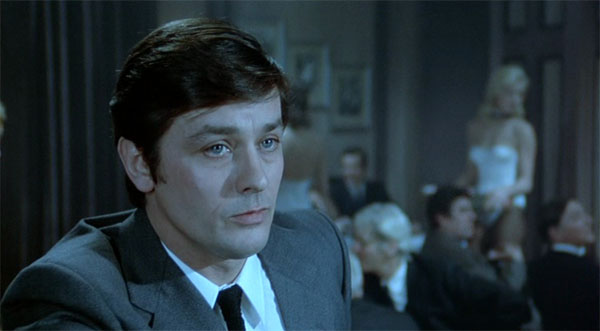“There are films that are a director’s last produced work,” writes Daniel Kasman, opening a typically insightful essay in the Notebook. “But there are also final films, ones which have nothing to do with a career, but rather are pictures that face a cinematic abyss or void, the ‘end of the line.’ They travel to an edge you can sense, the farthest edge of a precipice, and they peer past, or look back, or look down and see the void reflected in themselves. Jean-Pierre Melville’s last film, Un flic [1972], is also a final film, a picture that envisions the ruins laying beyond cinema’s construction of society, of masculinity, of modernity, of genre. Within these ruins the only activity left to the inhabitants is ritual—perfected rites which imitate and re-live the standards of others and of the past—and a belief in ritual which seems the only escape from the pervasive nihilism and emptiness of the ruined world.”
“Newly released by Rialto, Un flic begins its slow roll out at New York’s Film Forum (April 19-25).” J. Hoberman at Artinfo: “The movie is no masterpiece but, as tense and elliptical and steeped in Melvillean lore as it is, it should be catnip for the filmmaker’s devotees. High priest of tough-guy mysticism and master of the attitudinous gangster thriller, Melville not only anticipated the French new wave but served as a model for the neo new wave of Jim Jarmusch, Quentin Tarantino and Wong Kar-wai. Making his third film for the maestro, baby-faced Alain Delon plays an impossibly cool vice squad detective (the ‘flic’ of the title), whether slapping around recalcitrant suspects or doodling at the piano, his cigarette adangle, when Catherine Deneuve‘s calculating death angel materializes in hoodlum Richard Crenna’s showgirl-stocked night club.”
Crenna plays Simon, head of a band of four thieves “who take down an isolated seaside bank in the chillingly spare opening sequence,” writes Keith Uhlich in Time Out New York. “It’s a Zen-suspenseful set piece, all rock-steady compositions and hypnotically primordial atmosphere, as much a philosophical state of mind as a ticking-clock tension generator. (You’d expect nothing less from the great French director behind moodily elemental thriller like 1956’s Bob le Flambeur and 1967’s Le Samouraï.) Plus, it’s a terrific prelude to the film’s stripped-down battle of wits between Simon and the jaded Parisian police commissioner, Edouard (Alain Delon), who’s slowly catching on to the clandestine robber’s criminal dealings.”
“By the end of the film, order isn’t so much restored as it is reset,” writes John Oursler at Cinespect. “The ambiguity and derision from the film’s opening sequence are brought full circle by the closing shots, as Coleman [Delon], fresh off a massive triumph, heads to his next call, completely devoid of emotion and in utter silence. There’s little to celebrate here.”
“The film asks more questions than it answers, challenging Parisian modernism, playing provocatively with Melville’s leitmotif of the criminal death wish, and carrying strong homophilic subtext,” finds Tina Hassannia at Slant. “In Melville’s Paris, concrete and glass are as empty as the blank eyes of its inhabitants, no matter on which side of the law they reside.” Adds Simon Abrams in the Voice: “Un flic’s Paris is purgatory; the city’s silvery-blue, halogen-lit miasma is a fact of life.”
For news and tips throughout the day every day, follow @KeyframeDaily on Twitter and/or the RSS feed. Get Keyframe Daily in your inbox by signing in at fandor.com/daily.




